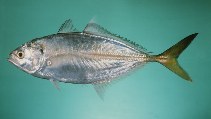Add your observation in Fish Watcher
| Native range | All suitable habitat | Point map | Year 2050 |

|
| This map was computer-generated and has not yet been reviewed. |
| Alepes djedaba AquaMaps Data sources: GBIF OBIS |
Upload your photos and videos
Pictures | Videos | Google imageAlepes djedaba
Picture by Randall, J.E.
Pictures | Videos | Google imageAlepes djedaba
Picture by Randall, J.E.
Israel country information
Common names:
Tarakhon, Tsninit du-yamit
Occurrence: introduced
Salinity: marine
Abundance: abundant (always seen in some numbers) | Ref: Walford, L. and R. Wicklund, 1973
Importance: commercial | Ref: Galil, B.S., 2007
Aquaculture: | Ref:
Regulations: | Ref:
Uses: no uses
Comments: A lessepsian migrant; (see Introduction Table). Large numbers caught occasionally with gill nets and light fishing (Ref. 6328). Recorded from Haifa Bay in 1924 (Ref. 72453). Also Ref. 93649.
National Checklist:
Country Information: https://www.cia.gov/library/publications/resources/the-world-factbook/geos/is.html
National Fisheries Authority:
Occurrences: Occurrences Point map
Main Ref: Por, F.D., 1978
National Database:
Occurrence: introduced
Salinity: marine
Abundance: abundant (always seen in some numbers) | Ref: Walford, L. and R. Wicklund, 1973
Importance: commercial | Ref: Galil, B.S., 2007
Aquaculture: | Ref:
Regulations: | Ref:
Uses: no uses
Comments: A lessepsian migrant; (see Introduction Table). Large numbers caught occasionally with gill nets and light fishing (Ref. 6328). Recorded from Haifa Bay in 1924 (Ref. 72453). Also Ref. 93649.
National Checklist:
Country Information: https://www.cia.gov/library/publications/resources/the-world-factbook/geos/is.html
National Fisheries Authority:
Occurrences: Occurrences Point map
Main Ref: Por, F.D., 1978
National Database:
Common names from other countries
Classification / Names ชื่อสามัญ | ชื่อพ้อง | Catalog of Fishes(สกุล, ชนิด) | ITIS | CoL | WoRMS | Cloffa
> Carangiformes (Jacks) > Carangidae (Jacks and pompanos) > Caranginae
Etymology: Alepes: Greek, alepis, -idos = without scales (Ref. 45335).
Etymology: Alepes: Greek, alepis, -idos = without scales (Ref. 45335).
Environment: milieu / climate zone / depth range / distribution range นิเวศวิทยา
เกี่ยวกับทะเล,น้ำเค็ม เกี่ยวกับหินโสโครก; สัตว์น้ำที่อพยพไปๆมาๆ ระหว่างแหล่งน้ำจืดกับทะเล ที่เป็นไปตามช่วงชีวิต (Ref. 51243). Subtropical; 46°N - 37°S, 19°E - 138°W
การแพร่กระจาย ประเทศต่างๆ | พื้นที่จำแนกตาม FAO | ระบบนิเวศหลายระบบ | การปรากฏขึ้น,การเกิดขึ้น,พบ | Point map | การแนะนำ | Faunafri
Indo-Pacific: Red Sea and East Africa (Ref. 12484) to the Hawaiian Islands, north to Japan, south to Australia. Immigrant to the eastern Mediterranean through the Suez Canal, wetward to Malta (Ref. 33971).
Length at first maturity / ขนาด / น้ำหนัก / Age
Maturity: Lm 16.3 range ? - ? cm
Max length : 40.0 cm TL เพศผู้/กระเทย; (Ref. 11228); common length : 25.0 cm FL เพศผู้/กระเทย; (Ref. 3397); น้ำหนักสูงสุดที่มีการรายงาน: 603.00 g (Ref. 128705)
Max length : 40.0 cm TL เพศผู้/กระเทย; (Ref. 11228); common length : 25.0 cm FL เพศผู้/กระเทย; (Ref. 3397); น้ำหนักสูงสุดที่มีการรายงาน: 603.00 g (Ref. 128705)
Short description เครื่องมือที่ใช้ในการแยกชนิดสัตว์,สิ่งมีชีวิตออกจากกัน | สัณฐานวิทยา | ความยาวต่างๆ
เงี่ยงครีบหลัง (รวม) : 9; ก้านครีบอ่อนที่หาง (รวม) : 22 - 25; เงี่ยงครีบก้น: 3; ก้านครีบอ่อนที่ก้น: 18 - 20.
Adults form large schools near inshore reefs (Ref. 30573). Feed on shrimps, copepods, decapod larvae and other crustacean larvae and small fish (Ref. 5213, 90102). Eggs are pelagic (Ref. 4233). Often caught by ski-boat anglers in southern Africa (Ref. 12484).
Life cycle and mating behavior วัยเจริญพันธุ์ | การสืบพันธุ์ | การวางไข่ | เซลสืบพันธ์ของเพศเมีย(ไข่) | ความดกของไข่ | ตัวอ่อน
Main reference
Upload your references | อ้างอิง | ผู้ประสานงาน : Smith-Vaniz, William F. | ผู้ร่วมมือ
Bauchot, M.-L., 1987. Poissons osseux. p. 891-1421. In W. Fischer, M.L. Bauchot and M. Schneider (eds.) Fiches FAO d'identification pour les besoins de la pêche. (rev. 1). Méditerranée et mer Noire. Zone de pêche 37. Vol. II. Commission des Communautés Européennes and FAO, Rome. (Ref. 3397)
IUCN Red List Status (Ref. 130435: Version 2024-2)
Least Concern (LC) ; Date assessed: 06 March 2015
Threat to humans
Harmless
Human uses
การประมง: การค้า; การตกปลาเป็นกีฬา: ใช่
FAO(การประมง: การผลิต; publication : search) | FishSource | ทะเลรอบๆเรา
ข้อมูลเพิ่มเติม
Population dynamics
Growth parameters
Max. ages / sizes
Length-weight rel.
Length-length rel.
Length-frequencies
Mass conversion
การทดแทนที่
อุดมสมบรูณ์
Growth parameters
Max. ages / sizes
Length-weight rel.
Length-length rel.
Length-frequencies
Mass conversion
การทดแทนที่
อุดมสมบรูณ์
Life cycle
การสืบพันธุ์
วัยเจริญพันธุ์
ความดกของไข่
การวางไข่
Spawning aggregations
เซลสืบพันธ์ของเพศเมีย(ไข่)
Egg development
ตัวอ่อน
พลวัตของสัตว์น้ำวัยอ่อน
การสืบพันธุ์
วัยเจริญพันธุ์
ความดกของไข่
การวางไข่
Spawning aggregations
เซลสืบพันธ์ของเพศเมีย(ไข่)
Egg development
ตัวอ่อน
พลวัตของสัตว์น้ำวัยอ่อน
Distribution
ประเทศต่างๆ
พื้นที่จำแนกตาม FAO
ระบบนิเวศหลายระบบ
การปรากฏขึ้น,การเกิดขึ้น,พบ
การแนะนำ
BRUVS - Videos
ประเทศต่างๆ
พื้นที่จำแนกตาม FAO
ระบบนิเวศหลายระบบ
การปรากฏขึ้น,การเกิดขึ้น,พบ
การแนะนำ
BRUVS - Videos
Physiology
Body composition
Nutrients
การใช้ออกซิเจน
รูปแบบการว่ายน้ำ
ระดับความเร็วในการว่ายน้ำ
Visual pigments
Fish sound
Diseases & Parasites
Toxicity (LC50s)
Body composition
Nutrients
การใช้ออกซิเจน
รูปแบบการว่ายน้ำ
ระดับความเร็วในการว่ายน้ำ
Visual pigments
Fish sound
Diseases & Parasites
Toxicity (LC50s)
Genetics
พันธุศาสตร์
Heterozygosity
อัตราพันธุกรรม
พันธุศาสตร์
Heterozygosity
อัตราพันธุกรรม
Human related
Aquaculture systems
ประวัติการเพาะเลี้ยงสัตว์น้ำ
สายพันธุ์
Ciguatera cases
Stamps, coins, misc.
Aquaculture systems
ประวัติการเพาะเลี้ยงสัตว์น้ำ
สายพันธุ์
Ciguatera cases
Stamps, coins, misc.
เครื่องมือ
Bio-Quiz | E-book | คู่มือภาคสนาม | เครื่องมือที่ใช้ในการแยกชนิดสัตว์,สิ่งมีชีวิตออกจากกัน | ผู้มีความชำนาญในเรื่องความถี่ของความยาว | เครื่องมือในการศึกษาชีวประวัติ | ตำแหน่งบนแผนที่ | Classification Tree
| Catch-MSY |
Special reports
Download XML
แหล่งที่มาจากอินเตอร์เน็ต
Alien/Invasive Species database | Aquatic Commons | BHL | Cloffa | BOLDSystems | Websites from users | Check FishWatcher | CISTI | Catalog of Fishes(สกุล, ชนิด) | DiscoverLife | ECOTOX | Faunafri | Fishtrace | GenBank(genome, nucleotide) | GloBI | GOBASE | | Google Books | Google Scholar | Google | IGFA World Record | MitoFish | ฐานข้อมูลแห่งชาติ | Otolith Atlas of Taiwan Fishes | PubMed | Reef Life Survey | Scirus | SeaLifeBase | แผนภูมิชีวิตแบบต้นไม้ | Wikipedia(Go, ค้นหา) | World Records Freshwater Fishing | บันทึกทางด้านสัตววิทยา
Estimates based on models
Preferred temperature (Ref. 115969): 24.7 - 29, mean 28 (based on 1150 cells).
Phylogenetic diversity index (Ref. 82804): PD50 = 0.5312 [Uniqueness, from 0.5 = low to 2.0 = high].
Bayesian length-weight: a=0.01349 (0.01205 - 0.01510), b=2.96 (2.93 - 2.99), in cm Total Length, based on LWR estimates for this species (Ref. 93245).
ระดับชั้นอาหาร (Ref. 69278): 3.6 ±0.54 se; based on food items.
ความสามารถในการกลับคืนสู่ปกติ (Ref. 120179): ความสูง, เวลาต่ำสุดที่จะทำให้ประชากรเพิ่มขึ้นเป็น 2 เท่าใช้เวลาน้อยกว่า 15 เดือน (K>0.3).
Fishing Vulnerability (Ref. 59153): Low vulnerability (18 of 100).
Climate Vulnerability (Ref. 125649): Moderate vulnerability (42 of 100).




